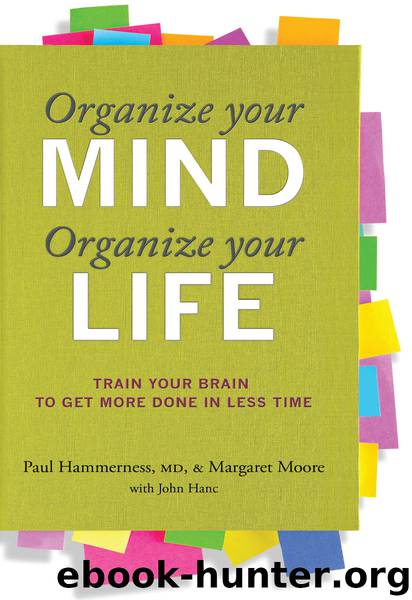Organize Your Mind, Organize Your Life: Train Your Brain to Get More Done in Less Time by Margaret Moore

Author:Margaret Moore
Language: eng
Format: epub
Publisher: Harlequin
Published: 2012-07-18T16:00:00+00:00
THERE’S NO STOPPING THESE STUDIES
No one seems to be putting the brakes on the study of inhibition. It has really emerged as a focal point of research as more scientists and mental health professionals begin to realize its importance in understanding a whole host of healthy human behaviors—including our topic: the ability to stay organized.
So how do the scientists study this process? They use tasks that involve applying the cognitive and behavioral brakes. Two common tasks have quite appropriate, intuitive names: the “go/no-go” and “stop-signal” tasks.
In these tasks, subjects sit in front of a computer screen and have to respond to noises or pictures that emit and flash in front of them. Simple instructions are given to isolate a specific brain function—such as sustained attention or inhibitory control.
In the stop-signal task, subjects are asked to identify a target as quickly as they can but then to cancel or inhibit their response with a so-called stop signal. Stop signals happen randomly, and as you can imagine, the closer one is to the point of no return—your hand is on the button, you are milliseconds away from pushing down on it—the harder it is to inhibit that response. Healthy persons usually need about 200 milliseconds of lead time in order to stop the response. So to subjects taking the test, the commands come across as “respond…respond…respond…respond… STOP!” Perhaps it’s not unlike the boss who says “yes, that’s right, that’s good, excellent, thanks,” and then suddenly, “no, that’s not it at all, you’ve done it all wrong!”
A similar test of inhibitory control is the go/no-go test, in which subjects respond quickly to specific “go” target letters on a computer screen and don’t respond or inhibit a response to alternate “no-go” letters. These tasks assess one’s ability to stop, to inhibit a response—whether it’s in the process or has not yet begun. Think of the game “Red Light, Green Light” you used to play as a child. You would line up with a bunch of friends, and then someone would shout “Green light!” You would all walk forward as fast as you could until you heard the command “Red light!” and you would all try to stop on a dime. Perhaps you can remember some kids falling over, twitching and giggling as they tried to “freeze” and remain perfectly still. Whereas others reacted instantly and stood still as statues—and still others disregarded the signals altogether and forged ahead.
These cognitive tasks are similar to this classic childhood game—and the true victory is won by the person who can stop as quickly and effectively and efficiently as they can go.
Scientists use these cognitive tasks in concert with the latest in neuroimaging tools to test a person’s ability to stop, thereby learning about the brain activity that is responsible for this skill. Studies using a host of neuroimaging techniques have identified specific brain networks as critical in inhibition. Signals can move from one brain region to another—such as the frontal cortical region and the basal ganglia—in order to coordinate a successful “stop” response.
Download
This site does not store any files on its server. We only index and link to content provided by other sites. Please contact the content providers to delete copyright contents if any and email us, we'll remove relevant links or contents immediately.
The Art of Thinking Clearly by Rolf Dobelli(10487)
Mindhunter: Inside the FBI's Elite Serial Crime Unit by John E. Douglas & Mark Olshaker(9339)
Change Your Questions, Change Your Life by Marilee Adams(7780)
Nudge - Improving Decisions about Health, Wealth, and Happiness by Thaler Sunstein(7706)
Mastermind: How to Think Like Sherlock Holmes by Maria Konnikova(7342)
The Power of Now: A Guide to Spiritual Enlightenment by Eckhart Tolle(5781)
Men In Love by Nancy Friday(5239)
Altered Sensations by David Pantalony(5103)
Factfulness: Ten Reasons We're Wrong About the World – and Why Things Are Better Than You Think by Hans Rosling(4742)
The Confidence Code by Katty Kay(4260)
Thinking in Bets by Annie Duke(4226)
Man and His Symbols by Carl Gustav Jung(4135)
The Worm at the Core by Sheldon Solomon(3486)
Why Buddhism is True by Robert Wright(3451)
Liar's Poker by Michael Lewis(3447)
Three Women by Lisa Taddeo(3433)
The Inner Life of Animals by Peter Wohlleben(3318)
Descartes' Error by Antonio Damasio(3277)
How Music Works by David Byrne(3268)
